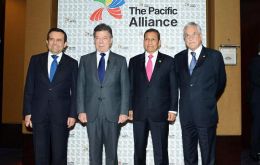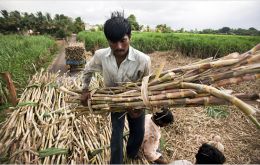MercoPress. South Atlantic News Agency
Economy
-
Thursday, September 26th 2013 - 22:43 UTC
Argentina appeals Judge Griesa ruling stating central bank reserves are ‘seizable’ for certain purposes

New York Judge Thomas Griesa has ruled against Argentina's request to dismiss a lawsuit over the Central Bank (BCRA) reserves, which if upheld could allow holdout creditors to seize assets belonging to the country.
-
Thursday, September 26th 2013 - 21:45 UTC
Pacific Alliance makes its official presentation in New York with three presidents

The Pacific Alliance made its official presentation in New York before 200 business people and investors, mostly from the US, with four top anchor men: the presidents of Chile, Peru and Colombia and Mexico’s foreign trade minister since head of state Enrique Peña Nieto had to remain in the country because of the catastrophic floods.
-
Thursday, September 26th 2013 - 21:36 UTC
Spain out of recession “but not out of the crisis”, Rajoy tells US financial media

President Mariano Rajoy making the round of financial media in New York this week, said Spain had emerged from recession in the third quarter with estimated economic growth of 0.1% to 0.2% forecast and 0.5% to 1% in 2014.
-
Thursday, September 26th 2013 - 21:04 UTC
A sugar rush that could fuel the economy

By R. Viswanathan (*) - India should take its cue from Brazil and invest in ethanol as a viable commercial substitute for costly petrol.
-
Thursday, September 26th 2013 - 06:51 UTC
Argentina expects a large crop of wheat next November despite recent frosts

Argentina is on track to harvest more wheat this season as greater acreage and coming warm weather should offset any yield loss caused by recent frosts that hit in the last days of the Southern Hemisphere winter.
-
Thursday, September 26th 2013 - 06:39 UTC
Brazilian industry forecasts higher GDP growth this year: 2.4%

The Brazilian industrial federation on Wednesday upped its 2013 growth forecast to 1.4% from 1% and its GDP growth projection from 2% to 2.4%. But, despite the better data, the National Confederation of Industry (CNI) urged caution. “The improved economic outlook is no guarantee of a strong growth rate,” it said.
-
Thursday, September 26th 2013 - 06:34 UTC
Storm death toll of recently sheared sheep in Uruguay climbs to 54.200, not counting lambs

The recent rain, wind and cold storm that severely punished Uruguayan farmers last week caused the death of 54.200 adult sheep. The sum from a survey conducted by the Uruguayan Wool Secretariat, SUL, almost doubles the original 30.000 estimate and does not include the recently born lambs.
-
Thursday, September 26th 2013 - 06:21 UTC
Argentina expects at least 50 million tons of soy and 30 million of corn in 2013/14

Argentina’s 2013/14 soybean crop will be above 50 million tons while corn can be expected to reach 30 million tons, according to the country’s Agriculture minister Norberto Yauhar, based on preliminary production estimates. The minister also advanced that caps on wheat and corn exports could be lifted in the near future.
-
Thursday, September 26th 2013 - 06:01 UTC
Brazil’s main manufacturing lobby calls for urgent resumption of trade talks with EU

The powerful manufacturers lobby, Sao Paulo’s Industry Federation, Fiesp believes a free trade agreement between Mercosur and the European Union is very much needed so that Latam’s largest economy climbs out from the “commercial isolation” in which it currently stands.
-
Thursday, September 26th 2013 - 05:58 UTC
Brazil’s development bank ‘overbooked’ needs support from the private sector

The Brazilian state development bank BNDES is “overbooked” and needs the private sector to step up funding in investments, according to bank president Luciano Coutinho. Lending by BNDES and other public banks has increased six times faster than credit by non-state bank this year, as the government tries to fuel economic growth.
